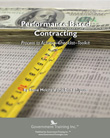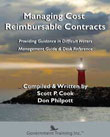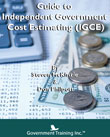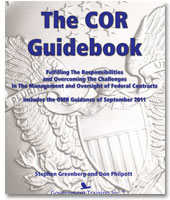Federal Contracting Basics for Investigators, IG's and Auditors
5 days – 40 CLPs
“Contracting Basics for Investigators, Auditors, and IGs was the best, most informative and useful training course I have taken in many years.” (Navy)
“I now feel confident that I have a good working background to the FAR. This was a missing link in my IG knowledge. The instructor was excellent … I look forward to taking additional GTI classes.” (Navy)
“Great Course… So useful” (GSA)

This course is available for On-Site Training Only. We will bring this course to your agency or company.
Contact Don Dickson, On-Site Training Manager at (301) 455-5633 or Don.Dickson@GovernmentTrainingInc.com
About this course
As an investigator, auditor, or inspector your professional skills and knowledge directly contribute to the success and growth of your organization, as well as insuring that the best interests of the public are protected. Federal Contracting Basics for Investigators, Auditors and Inspectors is an overview of the government contracting process, giving you the information you need to understand government procurement from start to finish — from contract formation to contract closeout.
In this course, we will identify the federal statutes that are applicable to government contracting, and we will analyze key contracting concepts, issues and processes so that you will develop a clear understanding of their practical application to your everyday job responsibilities, whether it is reviewing government contracts to ensure compliance with various laws and regulations or whether you provide some other investigative or review function, to include criminal investigations.
You will learn how government contracting works, the roles and responsibilities of the players in the process, how to find solutions to common contracting problems, how to understand the content of key contract documents, how to recognize warning signs of potential fraud, waste and abuse, and how to use resources, such as the Federal Acquisition Regulation (FAR) and contract case law, to research answers to contracting issues, questions and problems.
Who should attend
- Auditors
- Investigators
- IG staff
- Oversight executives
Course Syllabus
- What We Will Cover
- Definitions
- Regulations
- Key Steps in the Federal Contracting Process
- How Federal Government Contracting and Commercial Contracting Differ
- Authority to Contract
- Current Acquisition Environment
- Overview
- How to Select the Appropriate Contract Type
- Fixed-Price and Cost Reimbursement Contracts
- Level-of-Effort Contracts
- Indefinite Delivery Contracts
- Letter Contracts
- Options
- Competition Requirements
- Exceptions to the Competition Requirements
- Implementation of the Competition Requirements
- Practices That Restrict Competition
- Publicizing Contract Actions
- Overview of the Sealed Bidding Process
- Preparation of the Invitation for Bids (IFB)
- Release of the IFB
- Submission of Bids
- Evaluation of Bids
- Award of the Contract
- Overview
- When to Use Negotiated Contracting Procedures
- Developing the Request for Proposals (RFP)
- Drafting Evaluation Criteria
- Award Without Discussions
- Draft RFPs
- Cancellation of the RFP
- Submission and Evaluation of Proposals
- Setting the Competitive Range
- Conducting Meaningful Discussions
- Final Proposal Revisions
- Award and Debriefings
- When to Use Simplified Acquisition Procedures
- Simplified Acquisition Requirements
- Simplified Acquisition Procedures
- Overview
- Commercial Item Definitions
- The Federal Supply Schedule
- Commercial Item Contracting Procedures
- Commercial Item Clauses
- Small Business Policy
- Responsibility Determinations
- Small Business Set-Asides
- Small Business Programs
- The Buy American Act
- Introduction to Protests
- Agency Protests
- General Accountability Office Protests
- General Overview
- Cost Allowability
- Specific FAR Cost Principles
- The Truth In Negotiations Act
- Cost Accounting Standards
- Formal Contract Changes
- Coverage of the Changes Clause
- Constructive Changes
- Contract Interpretation
- Types of Constructive Changes
- Goals of the Inspection Process
- Inspection and Testing
- Government Remedies Under the Inspection Clauses
- Strict vs. Substantial Compliance
- Inspection Lessons Learned
- Acceptance
- Warranties
- Overview
- Measuring the Adjustment
- Methods of Proving the Adjustment Amount
- Advanced Topics
- Nature of Convenience Termination
- The Government's Right to Terminate for Convenience
- Termination Procedures
- Convenience Termination Settlements
- Overview
- The Government's Right to Terminate for Default
- Grounds for Default Termination
- Notice Requirements
- Contractor Defenses to Termination for Default
- The Contracting Officer's Decision
- Rights and Liabilities After Termination for Default
- Overview
- The Disputes Clause
- Contractor Claims
- Elements of a Claim
- Government Claims
- The Contracting Officer's Final Decision
- Appeals to the Boards of Contract Appeals
We have also completed many handbooks directed at the above business sectors. These include:
Please click on book image for details: |
 |
 |
 |
| Performance-Based Contracting | Managing Cost Reimbursable Contracts | Guide to Independent Government Cost Estimating | Small Business Contracting |
GT’s DUNS number is 964290881, and the Tax ID is 27-0799412.
About your Instructor
Ralph Capio heads the Government Business Management Sector for Government Training Inc.Previously, he was of Counsel to Armstrong Teasdale LLP, one of the Midwest's oldest and largest law firms, located in St. Louis. His practice focuses on commercial and government contracting and international business, and he lectures extensively on contemporary business subjects. He was a member of the adjunct faculty at Saint Louis University where he taught The Legal Environment of Business and International Negotiations; he taught Commercial Contracting (UCC) Law; International Law; and International Organizations for Webster University; Principles of Management and International Business for McKendree College; and has presented courses on commercial and international business law and practices for the University of Maryland, Boston University, and the University of Tampa. In addition, he has written numerous articles on contracting topics for national publications.
Prior to his present position, he held a number of senior positions in the Air Force. His Service included Legal Advisor to the U.S. Transportation Command and Chief Counsel to the U.S. Training Mission to Saudi Arabia--an organization responsible for more than $75 billion annually in foreign military sales and Government contracts--where he provided guidance on fiscal and contract law, international law, and criminal law. His work at the Dept. of Defense included service as a Judge Advocate and as a line officer, with assignments in the U.S., Europe, the Far East and the Middle East.
The recipient of numerous awards and decorations, including the Air Force's Outstanding Senior Attorney of the Year, he is a member of numerous professional organizations, including the American Bar Assn., the Int'l Bar Assn., the American Society for Public Admin., the Nat'l. Contract Management Assn., and the American Arbitration Association. He received a Bachelor of Arts degree from Rutgers University; a Juris Doctor degree from the Union University Albany School of Law; a Master of Public Admin. degree from the State University of NY; a Master of Laws degree from The George Washington University Law School; and a Master of International Business degree from St. Louis University.
Course Schedule
- Registration begins at 8:00 am
- Class begins at 8:30am
- Class ends at 4:30pm
- There are several 10-15 minute breaks throughout the day.
- Lunch generally begins at 12:00pm and lasts approximately 1 hour


